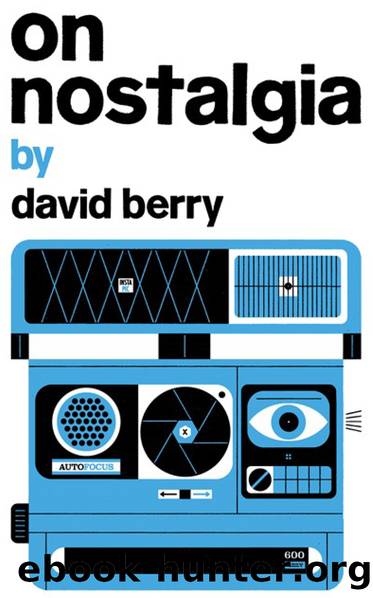On Nostalgia by David Berry

Author:David Berry
Language: eng
Format: epub
Publisher: Coach House Books
Published: 2020-09-15T00:00:00+00:00
5A Breath of Relief from This Fast-Paced World:On Consumed Nostalgia
Among the most consistent and popular posts on the nostalgia subreddit, one of the internetâs foremost collective repositories of recollection and reminiscence, are images of toys. Most of these toys tend to be derived from the childhood sweet spot of the first few generations with mass computer literacy, which is to say the mid-to-late eighties, nineties, and, more frequently now, the early 2000s. There is a mild tendency toward slightly more techy toys like video game systems â which are more than mere toys now but certainly werenât in the time most people are recollecting â but, Reddit reflecting the relentless interest of the crowd, no other real organizing principle beyond a rough timeline: Etch A Sketches and Easy-Bake Ovens show up as often as action figures and Pogs.
Toys are a natural focus for nostalgic inspiration: they are so ubiquitous throughout childhood that the act of putting them away for good is synonymous with growing up, giving them a symbolic weight that might well be unmatched, except maybe among certain childish foods. As objects, they are a natural repository for memory, and since presumably most of those memories are both positive and social â playing with siblings and friends, getting a special present from a relative, bragging to a classmate about that exact same present â they are ideal stuff for frequent, fond recollection. If play is truly as important as the psychologists think for forming full-blown humans from the primordial soup of childhood, toys might even represent some crucial aspect of our personality, stand-ins for formative experience or essential aspect of who we are.
The toys of this particular cohort of people, though, are unique from the dolls and board-game pieces that have counted as childhood amusements for at least as long as there has been society. Part of it is the simple fact that we live in an age of mass production, where it is easy for us to produce exact replicas of the things we might be yearning for: my grandmother might never have found an exact replica of the cloth doll her grandmother made for her, whereas I can go out and buy Barbies cut from the very same moulds â or at least the same patterns of moulds â that my mother would have had. More potent than the toysâ substance, though, is their psychological setting: thanks to a sustained rise in influence of market-based decisions on what constitutes appropriate mass communication toward children, and concurrent deregulation of advertising standards and television programming, any child born after roughly the mid-seventies â at least in advanced Western economies, and maybe most particularly in North America â has been subject to a ubiquitous and relentless marketing effort meant to ensure that those toys would become an essential and meaningful part of their childhood (at least until next seasonâs batch came along). Barring the most steadfast woodworking grandparent or paranoid unplugged parent, it is virtually guaranteed that at least one
Download
This site does not store any files on its server. We only index and link to content provided by other sites. Please contact the content providers to delete copyright contents if any and email us, we'll remove relevant links or contents immediately.
4 3 2 1: A Novel by Paul Auster(12356)
The handmaid's tale by Margaret Atwood(7732)
Giovanni's Room by James Baldwin(7303)
Asking the Right Questions: A Guide to Critical Thinking by M. Neil Browne & Stuart M. Keeley(5742)
Big Magic: Creative Living Beyond Fear by Elizabeth Gilbert(5728)
Ego Is the Enemy by Ryan Holiday(5395)
The Body: A Guide for Occupants by Bill Bryson(5066)
On Writing A Memoir of the Craft by Stephen King(4921)
Ken Follett - World without end by Ken Follett(4708)
Adulting by Kelly Williams Brown(4554)
Bluets by Maggie Nelson(4535)
Eat That Frog! by Brian Tracy(4502)
Guilty Pleasures by Laurell K Hamilton(4428)
The Poetry of Pablo Neruda by Pablo Neruda(4082)
Alive: The Story of the Andes Survivors by Piers Paul Read(4011)
White Noise - A Novel by Don DeLillo(3992)
Fingerprints of the Gods by Graham Hancock(3980)
The Book of Joy by Dalai Lama(3962)
The Bookshop by Penelope Fitzgerald(3829)
